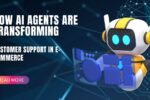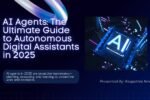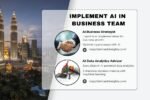“Isn’t agentic AI just a different name for generative AI?”
Lately, the question of Agentic AI vs Generative AI is one of the most popular inquiries I get. People often think these words mean the same thing, just like “AI” and “machine learning” used to. There is confusion everywhere, from blogs to webinars to boardroom talks.
People commonly discuss ChatGPT, copilots, and autonomous systems in the same sentence, perpetuating the fallacy of Agentic AI vs Generative AI. But treating them the same way makes the truth too simple. This misperception sets people up for failure and can even lead to poor business choices.
Let’s eliminate rid of the myth now. Generative AI and agentic AI are similar, but they do quite distinct things.
| Generative AI | Agentic AI |
| Creates content (text, images, code) | Plans, decides, and executes actions |
| Pattern recognition from data | Goal-driven reasoning & memory |
| Example: Writing an email | Example: Writing + sending + scheduling follow-ups |
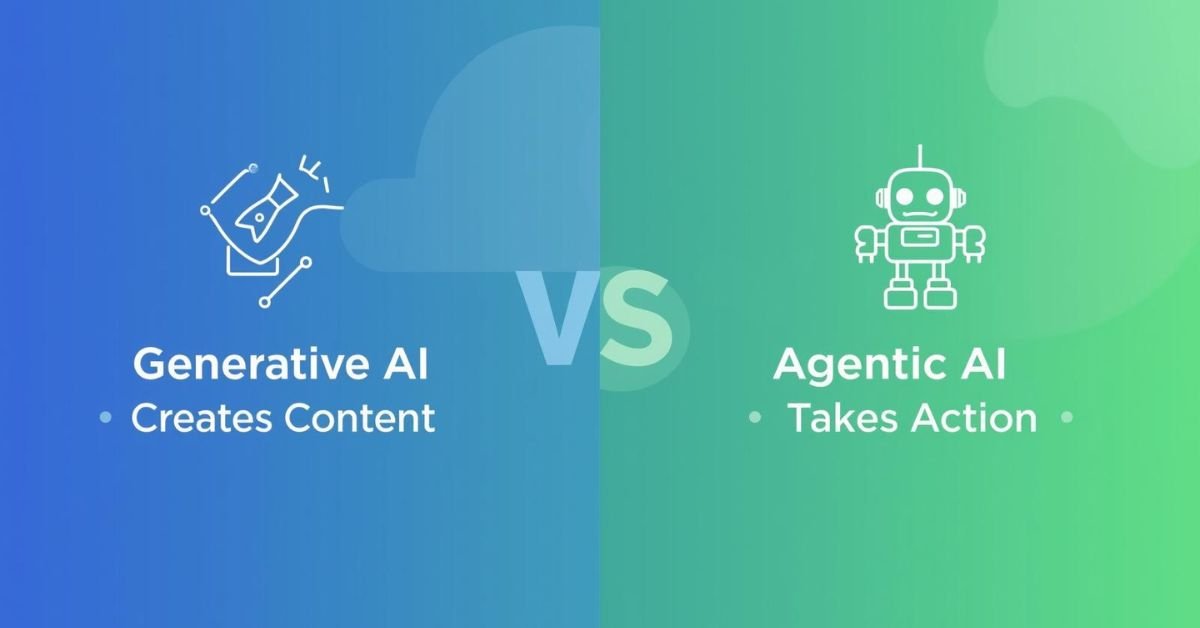
This graphic shows the main distinctions between generative AI and agentic AI. Generative AI is good at creating text, graphics, or code by finding patterns in data. Agentic AI, on the other hand, goes beyond producing things by planning, making choices, and carrying out actions to reach goals.
Myth 1: Agentic AI vs Generative AI: Are They the Same?
This fallacy is circulated because both employ complex models and appear similar. Agentic AI vs Generative AI often overlap, as generative AI is frequently a core component of agentic AI systems, making the distinctions between them less clear.
The Truth: They Are Different, Yet They Work Well Together.
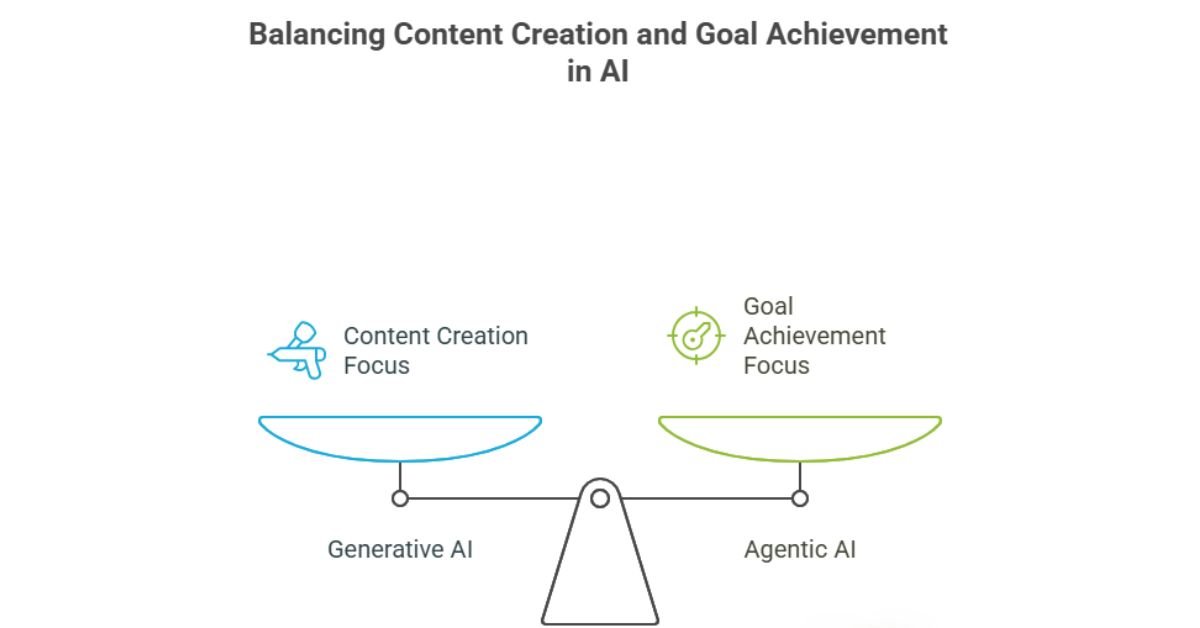
Generative AI is the “voice” that makes things happen by generating content, while Agentic AI is like the “brain and hands,” since it can plan, make decisions, and carry them out. When we look at Agentic AI vs Generative AI, it’s clear they work together to transform AI from a creative tool into a goal-driven system that delivers measurable outcomes.
In the context of Agentic AI vs Generative AI, generative AI makes things like text, pictures, code, and even music by finding patterns in data.
Generative AI creates content. Agentic AI creates outcomes
- Agentic AI advances the process. It doesn’t only make content; it also takes action, makes plans, and works toward goals.
- You could say that generative AI is the voice that talks. The brain and hands of agentic AI plan, make decisions, and do things.
- When you ask ChatGPT to create an email, that’s an example of generative AI. But if an AI system writes the email, sends it, sets up a follow-up, and keeps track of the task in your CRM, that’s agentic AI.
Myth #2: Agentic AI vs Generative AI: Key Myths Explained
Some people think that big language models like GPT-4 or image generators like MidJourney can do all the work on their own. In discussions of Agentic AI vs Generative AI, sensational headlines often make the situation worse by claiming that “AI is taking over everything.”
The Truth: Generative AI is a better tool than an agent.
- Generative AI can make things, but it doesn’t always know what to do next. It doesn’t know anything, remember anything, or be able to work toward goals over time.
- Agentic AI closes this gap. It improves on generative AI by adding the ability to make decisions, plan for the long term, and connect to other systems.
- Generative AI can write a legal contract or describe a patient’s medical history. Then, agentic AI takes the next step by translating insights into actions, including making appointments, ensuring rules are followed, or tracking activities in workflows – similar to how Manus AI Agents outperform ChatGPT. in executing autonomous AI tasks.”
- This difference is why companies exploring automation are now focusing on Agentic AI vs Generative AI frameworks, rather than just generative models.
Myth #3: Agentic AI Is Just “Automation with Fancy Branding”
Some people who don’t believe in agentic AI think it’s just a fancy way to automate things. After all, we already have scripts and bots that can do the same things over and over.
Automation follows rules. Agentic AI adapts
The Truth: Agentic AI Is More Flexible and Adaptable
Traditional automation follows strict guidelines. It often breaks when things change. Agentic AI, on the other hand, may change in real time by using reasoning, feedback loops, and learning.
For example:
- A bot that follows rules might only report an invoice if it costs more than $5,000.
- An AI with agency may look at spending habits, see strange behavior from suppliers, and suggest a fraud probe, even if the sum is less than $5,000.
- Agentic AI is far more powerful than basic scripts since it can change.
Why Myths Around Agentic AI vs Generative AI Still Exist
- Humans hold on to false ideas because AI is changing quicker than most humans can keep up with. When vendors use fashionable keywords to sell their products, the media often mixes up definitions. This noise makes it challenging for people in charge to make decisions.
- People are another cause. People tend to put things into easy groups, such as “this is AI” and “that is not.” But things aren’t always what they seem. Agentic AI vs Generative AI exist on a spectrum, which means that different levels of intelligence function together.
The Misunderstanding’s Effect on the Real World
- There are problems when you mix up generative AI and agentic AI. Leaders could think that the tools they have now can do more than they really can, and they might buy systems that don’t work. People might not employ agentic AI as much as they could because they think, “We already have AI.”
- In short, these myths make progress slower. Organizations need to know what each sort of AI can do in order to get the most out of it.
How They Work Together: A Closer Look
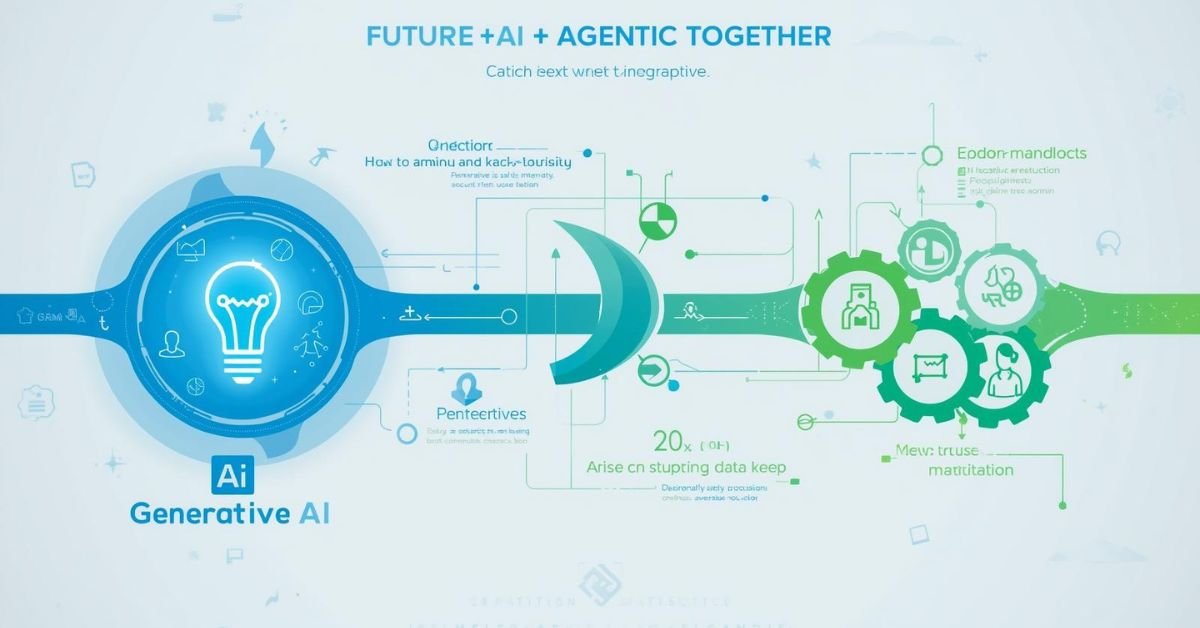
This example demonstrates how Agentic AI vs Generative AI work well together. Generative AI can write a legal contract or describe a patient’s medical history. Then, agentic AI takes the next step by translating insights into actions, including making appointments, ensuring rules are followed, or tracking activities in workflows.
Don’t think of generative and agentic AI as competitors; think of them as teammates.
- AI that makes things and options.
- Agentic AI makes decisions, takes action, and carries them out.
- They can change whole industries.
- For instance, generative AI could create a summary of a patient’s medical history. Then, agentic AI might set up follow-up appointments, order lab tests, and let doctors know about any problems.
- For example, generative AI may come up with a coating formula. Agentic AI could pretend to work, check for compliance, and suggest changes for real-world use.
- These partnerships show how important both are.
What Experts Think About Agentic AI vs Generative AI
- People in the industry are also making the difference clear.
- Microsoft researchers say that agentic AI are “systems that combine reasoning, memory, and action with generative models.”
- According to a Gartner estimate, “By 2026, 70% of businesses will use agentic AI in their workflows, not just for generative purposes.”
- These new ideas corroborate the change: generative AI started the trend, while agentic AI will keep it going.
Generative AI started the revolution – and research on autonomous AI trends shows that agentic AI will sustain it.
In conclusion, rethink the myth.
- Agentic AI vs Generative AI are not the same. Generative AI makes things, while agentic AI does things. Together, they change the way we operate and solve problems.
- The idea that they are interchangeable is too simple. It’s important to clear up this confusion. Understanding the differences can help companies generate new ideas more quickly, prevent unnecessary expenses, and maintain a competitive edge. For actionable strategies and case studies, check out AI for Businesses: Strategies, Tools, and Case Studies to Transform Operations.
- The greatest approach to go forward as AI continues to change is to stay curious, question the hype, and look beyond the buzzwords.
- Now you know how to tell the truth when someone says, “Agentic AI is just generative AI with a different name.”
Call to Action
- If this breakdown of Agentic AI vs Generative AI helped you understand things better, share it with your coworkers or friends. The first step to using AI responsibly and efficiently is to have a good grasp of it.
Disclaimer: This illustration highlights how Generative AI and Agentic AI complement one another. While Generative AI creates insights and outputs, Agentic AI executes, plans, and adapts. Together, they drive innovation across industries such as healthcare, finance, and manufacturing.
*Updated on September 07, 2025*

Hi, I’m Amarender Akupathni — founder of Amrtech Insights and a tech enthusiast passionate about AI and innovation. With 10+ years in science and R&D, I simplify complex technologies to help others stay ahead in the digital era.

